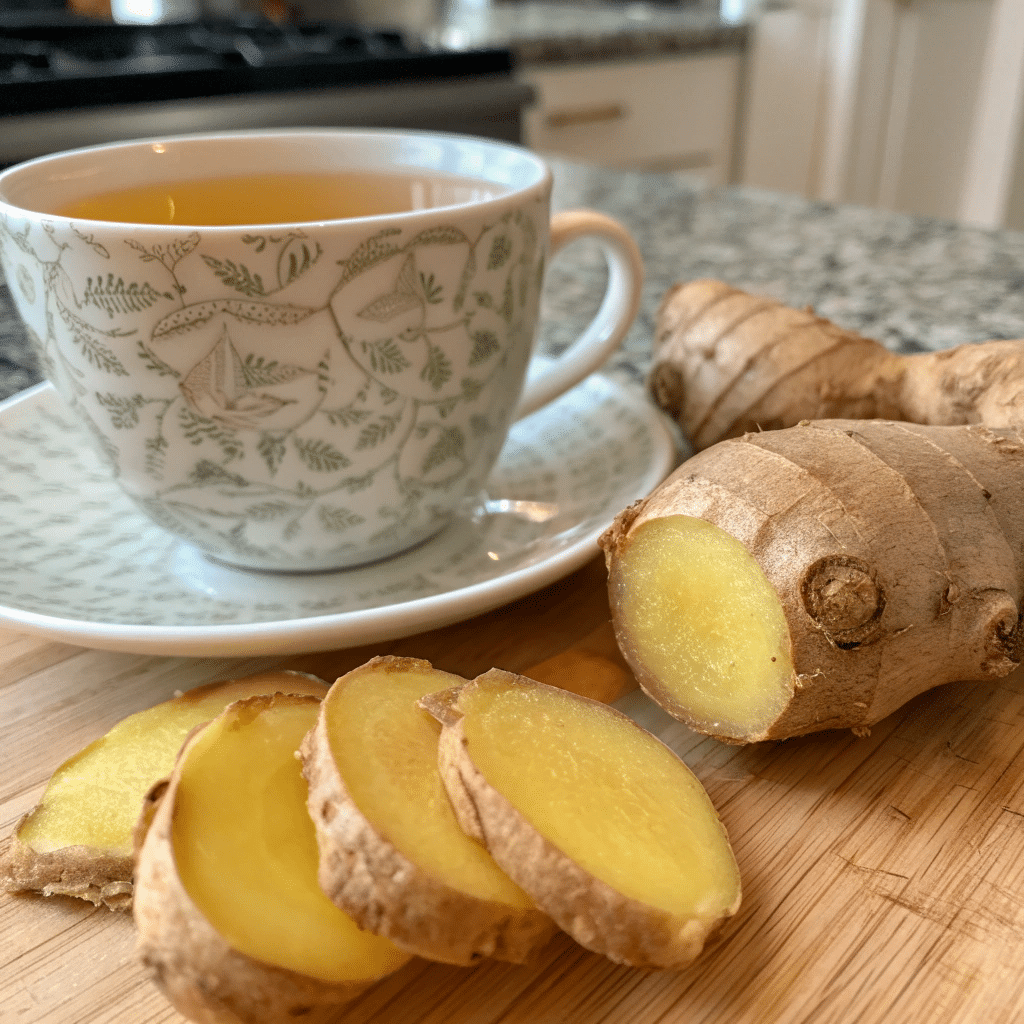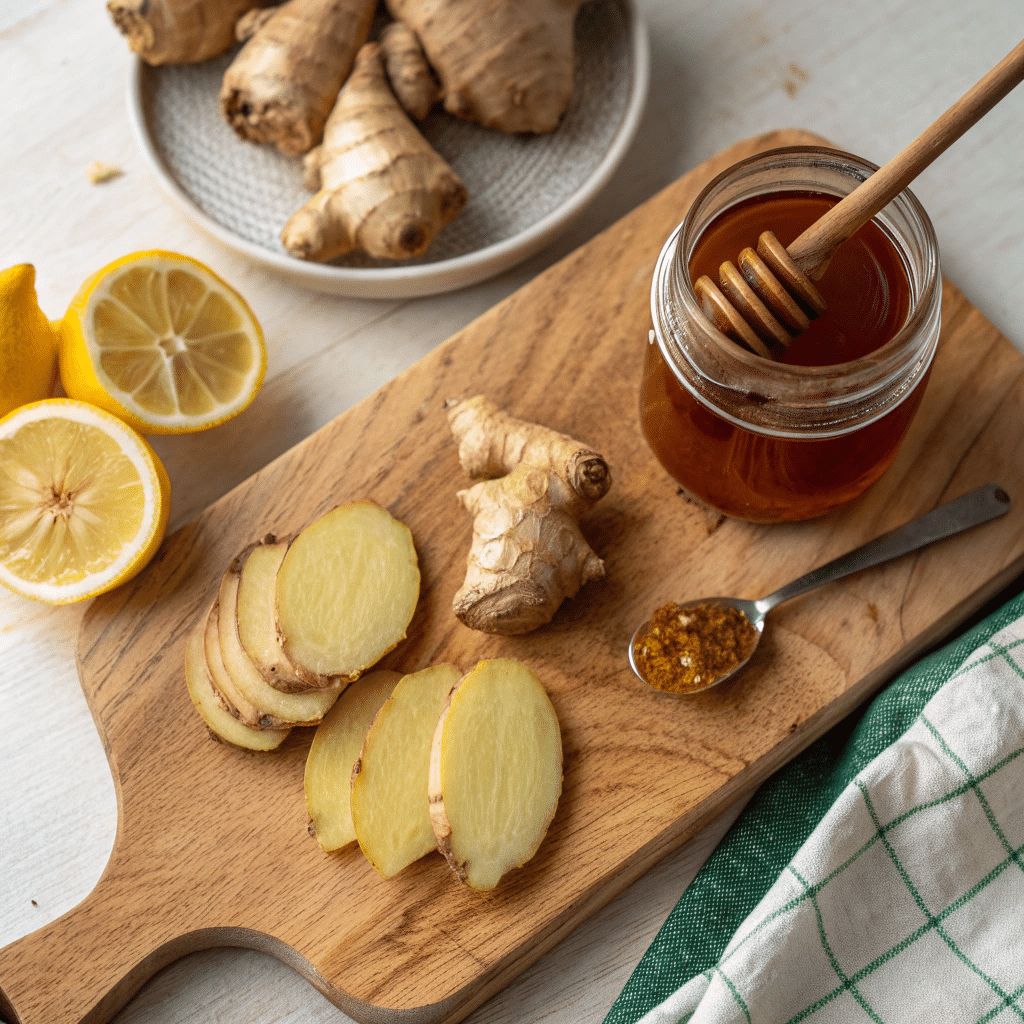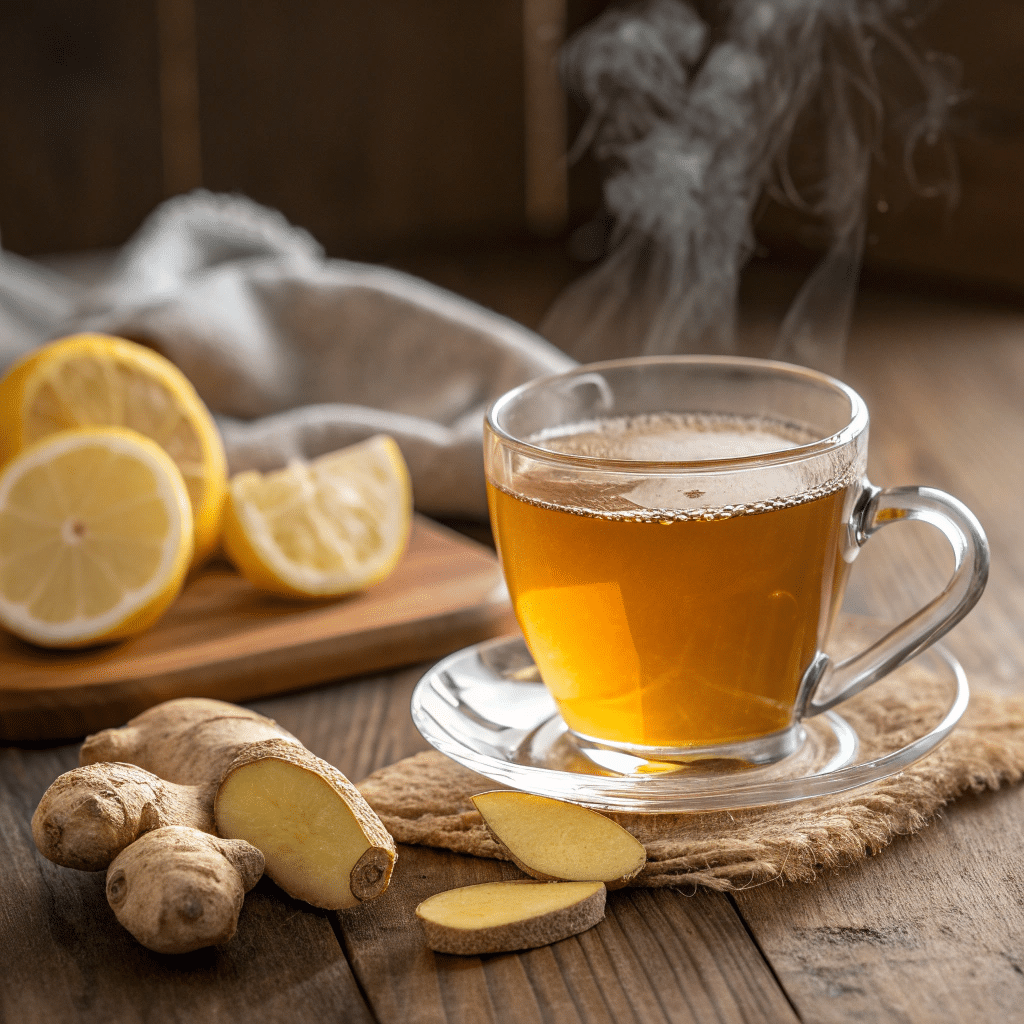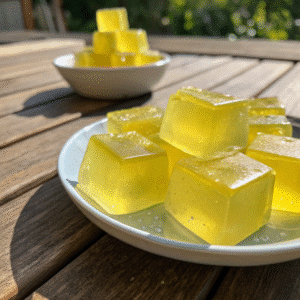In this article, we’ll explore the most important ginger tea benefits, how it supports different areas of health, the best times to enjoy it, and easy recipes you can try at home. You’ll also learn answers to the most common questions about ginger tea, so by the end, you’ll know exactly how this herbal drink can fit into your daily routine.
Don’t miss our guide to Coconut Water with Pineapple for another delicious metabolism booster.
Table of Contents
ToggleWhat is Ginger Tea?
Ginger tea is an herbal infusion made by steeping fresh ginger root or dried ginger powder in hot water. Unlike traditional teas that come from the Camellia sinensis plant, ginger tea is naturally caffeine-free. Its strong, slightly spicy flavor makes it a refreshing yet warming drink enjoyed worldwide.
Historical Use of Ginger for Health
Ginger has been used in traditional medicine for thousands of years. Ancient Chinese and Ayurvedic practitioners relied on ginger to treat ailments such as indigestion, colds, and joint pain. Historical texts even highlight ginger’s reputation as a universal remedy. Its widespread use across Asia, the Middle East, and Europe proves how valuable it has been for health and culinary purposes.
Why Ginger Tea Has Become Popular Today
Modern science has confirmed many of the traditional beliefs about ginger’s healing properties. With people increasingly seeking natural alternatives for wellness, ginger tea has gained popularity in households and cafes alike. It’s praised not only for its soothing qualities but also for its ability to support digestion, fight inflammation, and provide a daily boost without caffeine.
Learn more about natural fat-burning aids in our Mountain Root Supplement breakdown.
Print
Ginger Tea Benefits: A Complete Guide to Health and Wellness
5 Stars 4 Stars 3 Stars 2 Stars 1 Star
No reviews
- Author: Jessica Lupone!
- Total Time: 15 minutes
- Yield: 2 servings 1x
- Diet: Vegan
Description
A soothing, caffeine-free herbal infusion made from fresh ginger root, known for its powerful health benefits including digestive support, anti-inflammatory effects, and immune boosting properties.
Ingredients
1–2 inches fresh ginger root, peeled and sliced
2 cups water
Honey (optional)
Lemon juice (optional)
Fresh mint leaves (optional)
Instructions
1. Peel and thinly slice the fresh ginger root.
2. Bring 2 cups of water to a boil in a small pot.
3. Add the sliced ginger and reduce heat to a simmer.
4. Let the ginger simmer for about 10 minutes.
5. Strain the tea into a mug.
6. Add honey, lemon juice, or mint if desired for added flavor and benefits.
7. Stir and enjoy warm.
Notes
Drink 1–2 cups daily for optimal benefits.
Fresh ginger provides the most potent effects, but high-quality tea bags can be used for convenience.
Store leftover ginger tea concentrate in the fridge for up to one week.
Best enjoyed in the morning for energy or after meals for digestion.
Consult a doctor before use if pregnant or taking medications such as blood thinners.
- Prep Time: 5 minutes
- Cook Time: 10 minutes
- Category: Beverage
- Method: Boiled
- Cuisine: Herbal
Nutrition
- Serving Size: 1 cup
- Calories: 10
- Sugar: 0g
- Sodium: 5mg
- Fat: 0g
- Saturated Fat: 0g
- Unsaturated Fat: 0g
- Trans Fat: 0g
- Carbohydrates: 2g
- Fiber: 0g
- Protein: 0g
- Cholesterol: 0mg
Top Health Benefits of Ginger Tea
Digestive Support and Gut Health
One of the most well-known ginger tea benefits is its ability to soothe the digestive system. The natural compounds in ginger stimulate saliva, bile, and gastric enzymes, which help break down food more efficiently. Drinking ginger tea after meals can reduce bloating, ease indigestion, and speed up stomach emptying. For people who struggle with nausea — whether from motion sickness, morning sickness, or medical treatments — ginger tea offers gentle, natural relief.
Anti-Inflammatory and Pain Relief
Ginger contains gingerol, a bioactive compound with strong anti-inflammatory effects. Regular consumption of ginger tea can reduce inflammation that contributes to conditions like arthritis, joint pain, and even muscle soreness after exercise. Women often use ginger tea to manage menstrual cramps, as it can relax uterine muscles and ease pain without side effects from medications.
Boosting Immunity and Fighting Infections
Ginger tea is also recognized for its immune-boosting potential. The antioxidants in ginger help the body fight off oxidative stress, which weakens the immune system. Additionally, ginger has mild antimicrobial properties, which means it can help combat certain infections and support faster recovery from colds and sore throats. Pairing ginger tea with honey and lemon makes a powerful home remedy for seasonal flu and coughs.
Heart Health and Blood Sugar Regulation
Another impressive benefit of ginger tea is its role in cardiovascular and metabolic health. Studies suggest that ginger may help reduce LDL cholesterol, lower blood pressure, and improve circulation. These factors collectively support heart health and reduce the risk of cardiovascular disease. Ginger also plays a role in regulating blood sugar levels, making it a helpful addition to the diet for people managing type 2 diabetes.
Don’t miss our Zepbound Diet Plan guide to maximize your weight loss alongside the coffee loophole.

Ginger Tea for Specific Health Concerns
Ginger Tea for Nausea and Morning Sickness
One of the most studied ginger tea benefits is its ability to relieve nausea. Whether it’s caused by motion sickness, morning sickness during pregnancy, or post-surgery discomfort, ginger tea provides gentle and effective relief. The active compounds in ginger help calm the stomach and reduce the urge to vomit. For pregnant women, sipping ginger tea in moderation can be a safe and natural way to ease morning sickness, though it’s always best to consult a doctor before adding it daily.
Ginger Tea for Menstrual Pain and Cramps
Menstrual cramps can disrupt daily life, but ginger tea offers natural relief. Its anti-inflammatory properties reduce prostaglandins, the hormone-like substances that trigger uterine contractions and pain. Drinking ginger tea a few days before and during menstruation may lessen both the intensity and duration of cramps. Many women also find that ginger tea improves mood and energy during their cycle, making it a supportive drink during monthly discomfort.
Ginger Tea for Weight Loss and Metabolism
If you’re aiming to maintain a healthy weight, ginger tea can be a helpful addition to your routine. Ginger stimulates thermogenesis — the process where your body burns calories to produce heat. This, combined with its appetite-suppressing effects, can aid in weight management. Drinking ginger tea before meals may help curb overeating while supporting fat metabolism. Paired with a balanced diet and exercise, ginger tea becomes a natural companion for weight loss goals.
Ginger Tea for Cold, Flu, and Sore Throat
Ginger tea is a popular home remedy for seasonal colds and sore throats. Its warming properties increase circulation and help the body fight off infection. When combined with honey, ginger tea soothes irritated throats and suppresses coughing. Drinking a hot cup during flu season not only offers comfort but also supports the body’s natural defenses. For people prone to frequent colds, incorporating ginger tea into daily routines can help strengthen immunity over time.
Discover great ideas like our Mountain Root Supplement guide that pairs well with intermittent fasting and coffee-based routines.

Best Ways to Drink Ginger Tea Daily
How Often Should You Drink Ginger Tea?
For most healthy adults, one to two cups of ginger tea per day is considered safe and beneficial. This amount provides enough active compounds to support digestion, boost immunity, and fight inflammation without overwhelming the body. Drinking too much, however, may cause mild side effects such as heartburn or stomach irritation. Moderation is key when making ginger tea part of your daily routine.
Best Time to Drink Ginger Tea for Maximum Benefits
The timing of your ginger tea can influence the benefits you receive. Drinking a cup in the morning helps kickstart your metabolism and supports digestion for the day ahead. Sipping ginger tea after meals eases bloating and promotes better nutrient absorption. In the evening, it can soothe muscle tension and relax the body, though some people may find ginger too stimulating before bed.
Morning vs. Night: Timing Effects
- Morning Ginger Tea: Ideal for boosting energy naturally, improving digestion, and reducing nausea.
- Night Ginger Tea: Helpful for soothing cramps, easing joint pain, or calming the stomach before sleep.
Creating a schedule that matches your body’s needs allows you to maximize the ginger tea benefits without overdoing it.
Safety Considerations and Who Should Avoid It
While ginger tea is safe for most people, there are a few exceptions. Those taking blood thinners, diabetes medication, or high blood pressure drugs should consult their doctor before consuming ginger regularly, as it may interact with these medications. Pregnant women can drink ginger tea in moderation, but it’s best to avoid high doses. People with sensitive stomachs should also start with small amounts to see how their body responds.
Discover great ideas like our Keto Low-Carb Recipes that pair perfectly with this kind of high-fat morning drink.
Nutritional Profile and Active Compounds in Ginger Tea
Key Nutrients in Ginger Root
Ginger root is not only flavorful but also nutrient-rich. It provides small amounts of essential vitamins and minerals, including vitamin C, vitamin B6, magnesium, and potassium. These nutrients play a role in supporting the immune system, maintaining energy levels, and regulating blood pressure. Even though ginger tea is not a major source of macronutrients, the compounds it delivers are highly bioactive and beneficial for overall wellness.
Gingerol and Shogaol: Powerful Bioactive Compounds
The most notable ginger tea benefits come from gingerol and shogaol, the primary bioactive compounds in ginger. Gingerol is known for its strong anti-inflammatory and antioxidant properties, helping reduce oxidative stress in the body. Shogaol, formed when ginger is dried or heated, is even more potent and provides relief from nausea, inflammation, and digestive discomfort. Together, these compounds are what make ginger tea a powerful natural remedy.
How Nutrients Support Different Organs
- Stomach and Digestive Tract: Ginger’s active compounds promote smoother digestion, reduce bloating, and calm nausea.
- Heart and Circulatory System: Magnesium and potassium in ginger support healthy blood pressure, while antioxidants protect blood vessels.
- Liver and Detoxification: Ginger’s antioxidant effects may help reduce liver inflammation and support detox processes.
- Immune System: Vitamin C and gingerol strengthen the body’s defenses against infections and environmental stressors.
Don’t miss our post on Mountain Root Supplement — a natural booster that pairs perfectly with your coffee routine.
How to Make and Enjoy Ginger Tea at Home
Simple Fresh Ginger Tea Recipe
Making ginger tea at home is quick and easy. All you need is fresh ginger root, water, and an optional sweetener like honey.
Basic Recipe:
- Peel and slice 1–2 inches of fresh ginger root.
- Boil 2 cups of water and add the ginger slices.
- Simmer for 10 minutes, then strain.
- Add honey or lemon to taste.
This classic preparation provides all the core ginger tea benefits in their purest form.
Ginger Tea Variations with Lemon, Honey, or Mint
To enhance both flavor and health effects, many people enjoy customizing ginger tea:
- Lemon and Ginger Tea: Perfect for boosting vitamin C and fighting colds.
- Honey and Ginger Tea: Soothes sore throats and provides antibacterial benefits.
- Mint and Ginger Tea: Refreshing, cooling, and aids digestion after heavy meals.
These combinations not only taste great but also amplify the health benefits of your cup.
Storing and Preparing Ginger Tea Concentrates
For convenience, you can prepare ginger tea concentrate and store it in the refrigerator. Brew a strong batch of ginger tea, let it cool, and keep it in a sealed jar. This concentrate can last up to one week. Simply dilute with hot water whenever you want a quick cup. It’s a time-saving way to enjoy ginger tea daily without having to start from scratch.
Ready-Made Ginger Tea Bags vs. Fresh Ginger
While ginger tea bags are convenient, they may not always deliver the same potency as fresh ginger root. Tea bags often contain powdered ginger, which has a milder flavor and reduced concentration of active compounds. Fresh ginger root provides stronger taste and maximum health benefits. If convenience is your priority, high-quality organic ginger tea bags are still a good option.
Don’t miss our Chicken Sausage Air Fryer guide — the perfect low-carb, protein-packed brunch to enjoy after your fasting window ends.

Conclusion
Recap of the Main Ginger Tea Benefits
From calming nausea to reducing inflammation, ginger tea benefits cover multiple aspects of health. It supports digestion, strengthens the immune system, improves circulation, and may even help regulate blood sugar levels. Whether enjoyed hot on a chilly day or combined with lemon and honey during flu season, ginger tea is a versatile and powerful drink.
Final Thoughts on Making Ginger Tea a Daily Habit
Ginger tea is more than just a tasty herbal infusion — it’s a natural remedy that has stood the test of time. By drinking it in moderation, you can experience its many health-promoting effects while avoiding unwanted side effects. If you’re ready to embrace a healthier lifestyle, start by adding a warm cup of ginger tea to your daily routine.
For more recipes Follow me in our Social media
Facebook: https://www.facebook.com/profile.php?id=61573913076847
Pinterest: https://www.pinterest.com/momandgrandmacooks/
Medium: https://medium.com/@momandgrandmacooks
FAQs About Ginger Tea Benefits
Is it good to drink ginger tea every day?
Yes, drinking ginger tea daily can be good for most people. A cup or two per day helps with digestion, reduces inflammation, and supports immunity. However, consuming large amounts may cause mild side effects like heartburn or upset stomach. Those on medications such as blood thinners should consult a doctor before drinking it regularly.
What is the main benefit of ginger tea?
The most recognized benefit of ginger tea is its digestive support. It helps ease nausea, bloating, and indigestion. In addition, it offers strong anti-inflammatory properties that reduce pain and promote overall wellness.
What organ is ginger good for?
Ginger mainly supports the stomach and digestive system, but it also benefits the heart by helping regulate blood pressure and cholesterol. Its antioxidants may also protect the liver and strengthen the immune system.
What is the best time to drink ginger tea?
The best time depends on your needs. Morning ginger tea helps kickstart metabolism and reduce nausea, while an after-meal cup eases digestion. At night, it can relax muscles and soothe pain, but some people may prefer to avoid it right before bed if they find ginger stimulating.








